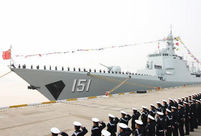 Famous Lanzhou beef noodles
Famous Lanzhou beef noodles Armed Police hold anti-terrorism drill in SE China's Xiamen
Armed Police hold anti-terrorism drill in SE China's Xiamen Harbin Int'l Ice and Snow Festival opens
Harbin Int'l Ice and Snow Festival opens 'Jin' named the word of the year by cross-strait netizens
'Jin' named the word of the year by cross-strait netizens Chinese scientific expedition goes to build new Antarctica station
Chinese scientific expedition goes to build new Antarctica station
 Chinese naval escort fleet conducts replenishment in Indian Ocean
Chinese naval escort fleet conducts replenishment in Indian Ocean 17th joint patrol of Mekong River to start
17th joint patrol of Mekong River to start China's moon rover, lander photograph each other
China's moon rover, lander photograph each otherFrom state to private
Ever since the Third Plenum in 1978, China's opening up has always had two fronts, one externally and the other internally, said Deng Xiaoping, the architect of Chinese economic reforms.
Having inherited a command economy where everything was managed by the state, China over the years granted the free market an ever prominent role to play.
This year's plenum decision said that the free market's role will be "decisive," recognizing the private sector's indispensable role in fostering economic growth and job creation.
The private sector contributed over 60 percent of gross domestic product and new hires in 2012, according to statistics.
China will abolish all forms of unreasonable regulations and eliminate hidden barriers against the private sector, opening a wide range of businesses once dominated by state-owned enterprises (SOEs), the decision said.
China has eliminated hundreds of administrative approvals as part of efforts to reduce intervention in the economy, and implemented a negative list approach in a pilot Shanghai Free Trade Zone opened in late September.
Unlike a positive list approach, in which nothing is allowed before governmental approval, the negative list approach allows anything unless specifically prohibited, said David Dollar, a senior fellow with the John L. Thornton China Center of the Brookings Institute.
"The overregulation of routine business creates a lot of opportunities for corruption and makes the economy less efficient, " he said.
The professional services company KPMG noted the decision also conveyed encouraging signs for reforming SOEs in land use, loans, and industrial policies, which are marred by inefficiency and create dysfunctions in the role of the market.
China shall actively develop a diversified ownership economy and allow more SOEs and other ownership enterprises to develop into mixed ownership enterprises. Non-state shares will be allowed in state capital investment projects, the decision said, effectively opening SOE shareholding to private enterprises.
"It is reasonable to believe that within a decade, private capital will play more important roles in areas dominated by SOEs, such as banking and infrastructure, as well as medical facilities such as hospitals," KPMG predicted.
"It is highly likely that another golden decade in China is just around the corner," said KPMG.

 Chinese Consulate General in S.F. burned for arson attack
Chinese Consulate General in S.F. burned for arson attack Roar of J-15 fighter is melody for operator on the Liaoning
Roar of J-15 fighter is melody for operator on the Liaoning A 90-year-old forester's four decades
A 90-year-old forester's four decades Most touching moments in 2013
Most touching moments in 2013 2013: Joys and sorrows of world politicians
2013: Joys and sorrows of world politicians Missile destroyer Zhengzhou commissioned to Chinese navy
Missile destroyer Zhengzhou commissioned to Chinese navy China is technically ready to explore Mars
China is technically ready to explore Mars Photo story: Life changed by mobile technology
Photo story: Life changed by mobile technology Bullet train attendants' Christmas Eve
Bullet train attendants' Christmas Eve Heart-warming Laba porridge
Heart-warming Laba porridge Gallery: China's trapped icebreaker makes successful escape
Gallery: China's trapped icebreaker makes successful escape Photo story: We are special soldiers
Photo story: We are special soldiers 'Rong' selected HK's character of the year for 2014
'Rong' selected HK's character of the year for 2014 Famous Lanzhou beef noodles
Famous Lanzhou beef noodles Chinese Consulate Arson Suspect Makes 1st Court Appearance
Chinese Consulate Arson Suspect Makes 1st Court AppearanceDay|Week|Month